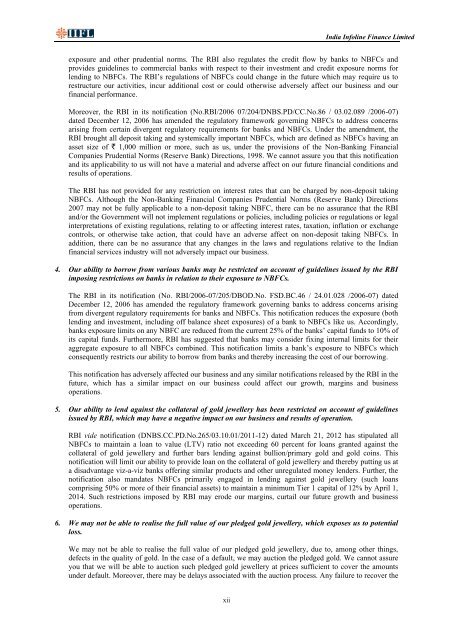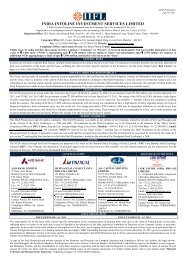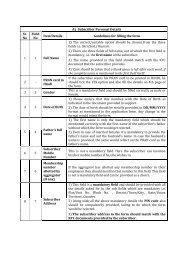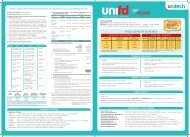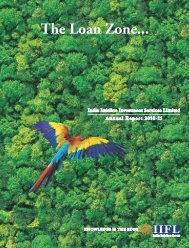INDIA INFOLINE FINANCE LIMITED - Securities and Exchange ...
INDIA INFOLINE FINANCE LIMITED - Securities and Exchange ...
INDIA INFOLINE FINANCE LIMITED - Securities and Exchange ...
Create successful ePaper yourself
Turn your PDF publications into a flip-book with our unique Google optimized e-Paper software.
India Infoline Finance Limited<br />
exposure <strong>and</strong> other prudential norms. The RBI also regulates the credit flow by banks to NBFCs <strong>and</strong><br />
provides guidelines to commercial banks with respect to their investment <strong>and</strong> credit exposure norms for<br />
lending to NBFCs. The RBI’s regulations of NBFCs could change in the future which may require us to<br />
restructure our activities, incur additional cost or could otherwise adversely affect our business <strong>and</strong> our<br />
financial performance.<br />
Moreover, the RBI in its notification (No.RBI/2006 07/204/DNBS.PD/CC.No.86 / 03.02.089 /2006-07)<br />
dated December 12, 2006 has amended the regulatory framework governing NBFCs to address concerns<br />
arising from certain divergent regulatory requirements for banks <strong>and</strong> NBFCs. Under the amendment, the<br />
RBI brought all deposit taking <strong>and</strong> systemically important NBFCs, which are defined as NBFCs having an<br />
asset size of ` 1,000 million or more, such as us, under the provisions of the Non-Banking Financial<br />
Companies Prudential Norms (Reserve Bank) Directions, 1998. We cannot assure you that this notification<br />
<strong>and</strong> its applicability to us will not have a material <strong>and</strong> adverse affect on our future financial conditions <strong>and</strong><br />
results of operations.<br />
The RBI has not provided for any restriction on interest rates that can be charged by non-deposit taking<br />
NBFCs. Although the Non-Banking Financial Companies Prudential Norms (Reserve Bank) Directions<br />
2007 may not be fully applicable to a non-deposit taking NBFC, there can be no assurance that the RBI<br />
<strong>and</strong>/or the Government will not implement regulations or policies, including policies or regulations or legal<br />
interpretations of existing regulations, relating to or affecting interest rates, taxation, inflation or exchange<br />
controls, or otherwise take action, that could have an adverse affect on non-deposit taking NBFCs. In<br />
addition, there can be no assurance that any changes in the laws <strong>and</strong> regulations relative to the Indian<br />
financial services industry will not adversely impact our business.<br />
4. Our ability to borrow from various banks may be restricted on account of guidelines issued by the RBI<br />
imposing restrictions on banks in relation to their exposure to NBFCs.<br />
The RBI in its notification (No. RBI/2006-07/205/DBOD.No. FSD.BC.46 / 24.01.028 /2006-07) dated<br />
December 12, 2006 has amended the regulatory framework governing banks to address concerns arising<br />
from divergent regulatory requirements for banks <strong>and</strong> NBFCs. This notification reduces the exposure (both<br />
lending <strong>and</strong> investment, including off balance sheet exposures) of a bank to NBFCs like us. Accordingly,<br />
banks exposure limits on any NBFC are reduced from the current 25% of the banks’ capital funds to 10% of<br />
its capital funds. Furthermore, RBI has suggested that banks may consider fixing internal limits for their<br />
aggregate exposure to all NBFCs combined. This notification limits a bank’s exposure to NBFCs which<br />
consequently restricts our ability to borrow from banks <strong>and</strong> thereby increasing the cost of our borrowing.<br />
This notification has adversely affected our business <strong>and</strong> any similar notifications released by the RBI in the<br />
future, which has a similar impact on our business could affect our growth, margins <strong>and</strong> business<br />
operations.<br />
5. Our ability to lend against the collateral of gold jewellery has been restricted on account of guidelines<br />
issued by RBI, which may have a negative impact on our business <strong>and</strong> results of operation.<br />
RBI vide notification (DNBS.CC.PD.No.265/03.10.01/2011-12) dated March 21, 2012 has stipulated all<br />
NBFCs to maintain a loan to value (LTV) ratio not exceeding 60 percent for loans granted against the<br />
collateral of gold jewellery <strong>and</strong> further bars lending against bullion/primary gold <strong>and</strong> gold coins. This<br />
notification will limit our ability to provide loan on the collateral of gold jewellery <strong>and</strong> thereby putting us at<br />
a disadvantage viz-a-viz banks offering similar products <strong>and</strong> other unregulated money lenders. Further, the<br />
notification also m<strong>and</strong>ates NBFCs primarily engaged in lending against gold jewellery (such loans<br />
comprising 50% or more of their financial assets) to maintain a minimum Tier 1 capital of 12% by April 1,<br />
2014. Such restrictions imposed by RBI may erode our margins, curtail our future growth <strong>and</strong> business<br />
operations.<br />
6. We may not be able to realise the full value of our pledged gold jewellery, which exposes us to potential<br />
loss.<br />
We may not be able to realise the full value of our pledged gold jewellery, due to, among other things,<br />
defects in the quality of gold. In the case of a default, we may auction the pledged gold. We cannot assure<br />
you that we will be able to auction such pledged gold jewellery at prices sufficient to cover the amounts<br />
under default. Moreover, there may be delays associated with the auction process. Any failure to recover the<br />
xii


